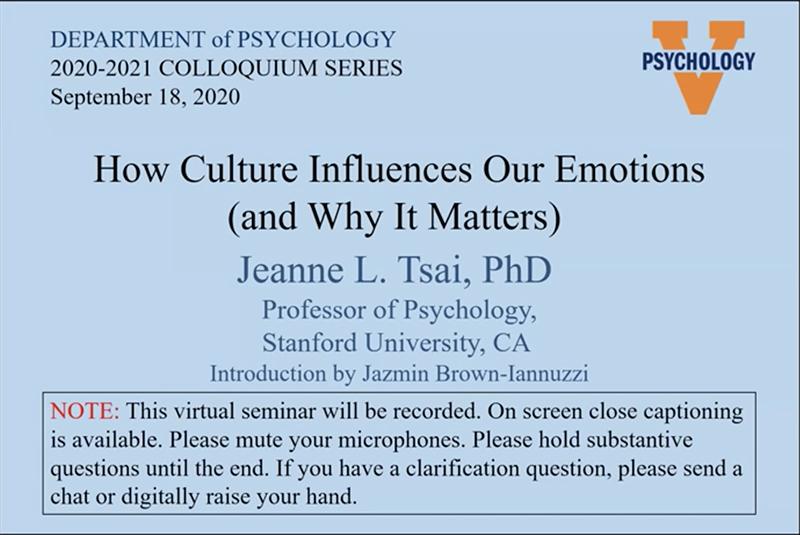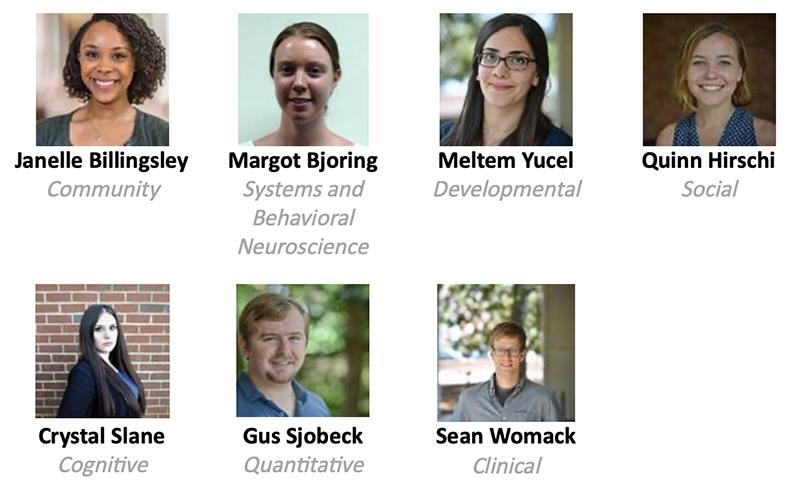2022-2023
2022-2023 Colloquia
Date & Time | Name | Talk Title | Institution | Location
9/2/2022 | Tim Wilson | Strangers to Ourselves | UVA| Gilmer 390
9/16/2022 | Dan Willingham and Chad Dodson | DEI and Syllabi | UVA | Gilmer 390
10/7/2022 | Bernardette Pinetta (Rising Star) | Enriching Latinx Adolescents' Ethnic-Racial Identity Development as a Pathway to Resistance | University of Michigan | 130 Monroe Hall
11/4/2022 | Ralph Adolphs | Social Judgments from Faces| Caltech| Zoom
11/11/2022 | Michelle Claiborne | Title IX workshop | UVA | Gilmer 390
12/2/2022 | Allison Nguyen (Rising Star) | Absolutely Persuasive, Kinda Negotiating| UC-Santa Cruz | 130 Monroe Hall
1/27/2023 | Karen Quigley | TBA | Northeastern | TBA
2/10/2023 | Kayden Stockwell | TBA | UVA | TBA
3/3/2023 | Patrick Grzanka | TBA | University of Tennessee-Knoxville | TBA
3/17/2023 | Charan Ranganath | TBA | UC-Davis | TBA
3/24/2023 | Laura Jamison | TBA | UVA | TBA
3/31/2023 | Gorana Gonzalez (Rising Star) | TBA | UMass-Amherst | TBA
4/14/2023 | Bita Moghaddam | TBA | Oregon Health and Science University | TBA
2021
Crossing Status Divides: Stereotypes, Strategies, and Solutions | Cydney H. Dupree, PhD
MAY 7, 2021
CYDNEY H. DUPREE, PH.D.
Assistant Professor of Organizational Behavior | Yale University | School of Management

CROSSING STATUS DIVIDES: STEREOTYPES, STRATEGIES, AND SOLUTIONS
Intergroup interactions can be difficult, particularly those that occur between members of traditionally high-status and low-status groups. Well-intentioned majorities (e.g., White liberals) may find themselves unintentionally contributing to this problem by engaging in well-meaning, but ultimately patronizing, verbal behavior. Racial minorities who are more supportive of inequality (e.g., Black orLatinx conservatives) may give themselves a leg up by reversing stereotypes during conversations in the workplace, on social media, or with a stranger. In this talk, I present a series of studies that use advances in natural language processing to examine how White Americans and racial minorities reverse negative stereotypes via speech—potentially impacting who gets along and who gets ahead in an increasingly diverse world.
Join us online: Friday, May 7, 2021, 1:30 - 2:30 pm Eastern Time (US and Canada)
Zoom Link | Passcode: 448664 | Meeting ID: 912 8309 7841
Hosted by: Jazi Brown-Iannuzzi
Mechanisms of Threat Control in Humans | Elizabeth A. Phelps
APRIL 23, 2021
ELIZABETH A. PHELPS
2021 L. STARLING REID CONFERENCE KEYNOTE SPEAKER
Pershing Square Professor of Human Neuroscience | Department of Psychology, Harvard University

MECHANISMS OF THREAT CONTROL IN HUMANS
Animal models of associative threat learning provide a basis for understanding human fears and anxiety. Building on research from animal models, I will explore a range of means maladaptive defensive responses can be acquired and diminished in humans. First, I will outline how extinction and emotion regulation, techniques adapted in cognitive behavioral therapy, can be used to control learned defensive responses via inhibitory signals from the ventromedial prefrontal cortex to the amygdala. One drawback of these techniques is that these responses are only inhibited and can return, with one factor being stress. I will then review research examining the lasting control of maladaptive defensive responses by targeting memory reconsolidation and present evidence suggesting that the behavioral interference of reconsolidation in humans diminishes involvement of the prefrontal cortex inhibitory circuitry, although there are limitations to its efficacy. Finally, I will describe two novel behavioral techniques that might result in a more lasting fear reduction by providing control over the stressor and introducing novelty.
Join us on Friday, April 23, 2021
3:30-4:30 EST Lecture
4:30-4:45 EST Being Human in Psychological Science (Informal Q&A with keynote speaker, Elizabeth A. Phelps, PhD, about her path in psychological science. All are encouraged to turn camera’s on and participate.)
Zoom Link | Password: Reid
Visit L. Starling Reid Conference home page for more information about the all-day conference.
From Twins to Polygenic Scores: Variance to Biology and Back | Eric Turkheimer
MARCH 19, 2021
ERIC TURKHEIMER
ASTON-GOTTESMAN LECTURER
Hugh Scott Hamilton Professor of Psychology

FROM TWINS TO POLYGENIC SCORES: VARIANCE TO BIOLOGY AND BACK
The concept of heritability is emblematic of behavioral genetics, but its precise meaning has always been controversial. This talk will trace the origins of the concept from Darwin and Galton, through its uses in plant and animal breeding to its application to twin studies and contemporary work using measured DNA. Understanding the history of heritability is the key to using and critiquing the concept accurately and responsibly.
Being Human in Psychological Science: Join us after the formal colloquium for a 15-20 minute informal Q&A to discuss Professor Turkheimer's path in psychological science. The conversation will be moderated by a graduate student, and the conversations are especially intended for undergraduate and graduate students (though everyone is welcome). Because one goal is to use this as an opportunity to foster community, we encourage people to turn on their cameras if they have been off during the colloquium. Questions from the audience can be entered in the chat.
Join us on Friday, March 19, 2021, 1:30 - 2:30 pm EST
Zoom Link | Password: 828326
2020
The Visceral Mind: The Roll of the Body in Affect | Dr. Jennifer MacCormack, PhD
DECEMBER 4, 2020
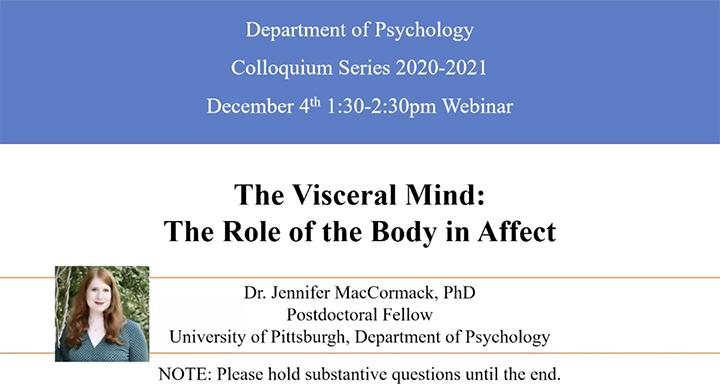
Motivations to Learn: Distinct Neural Contexts for Memory Systems and their Regulation | Alison Adcock, MD, PhD
OCTOBER 23, 2020
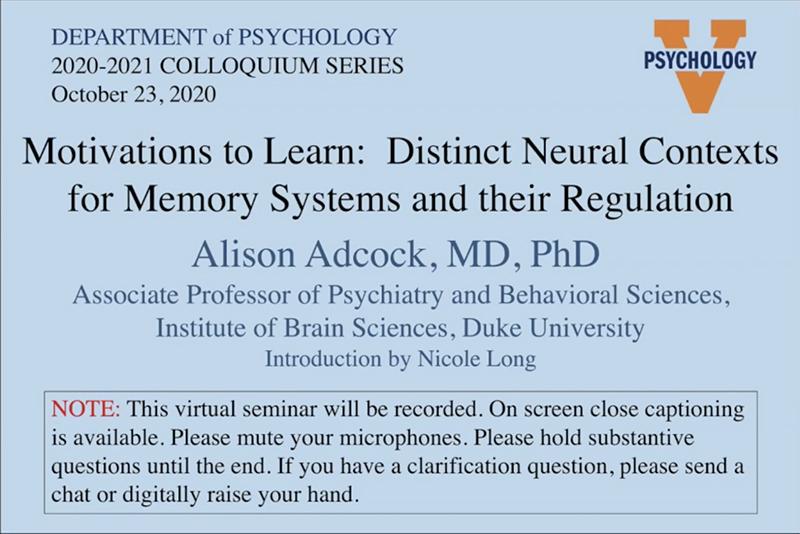
Robust Bayesian Analysis of Longitudinal Data using Conditional Medians | Cynthia Tong
OCTOBER 9, 2020
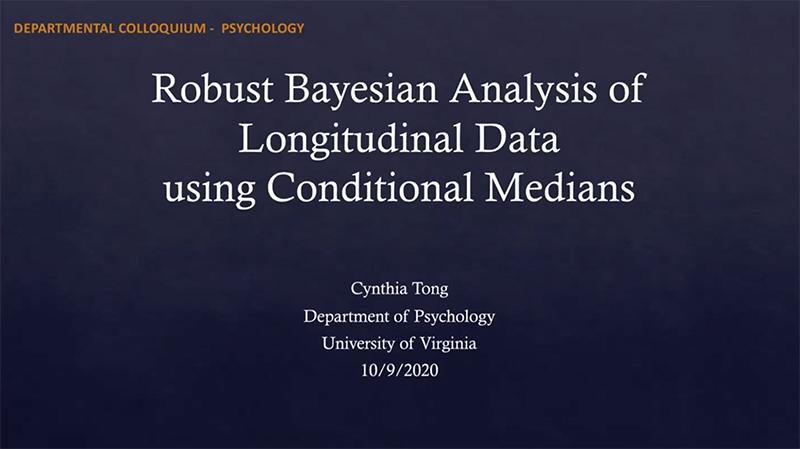
Communicating in Crowds: How the auditory system adapts to complex acoustic environments | Dan Meliza, PhD
SEPTEMBER 25, 2020
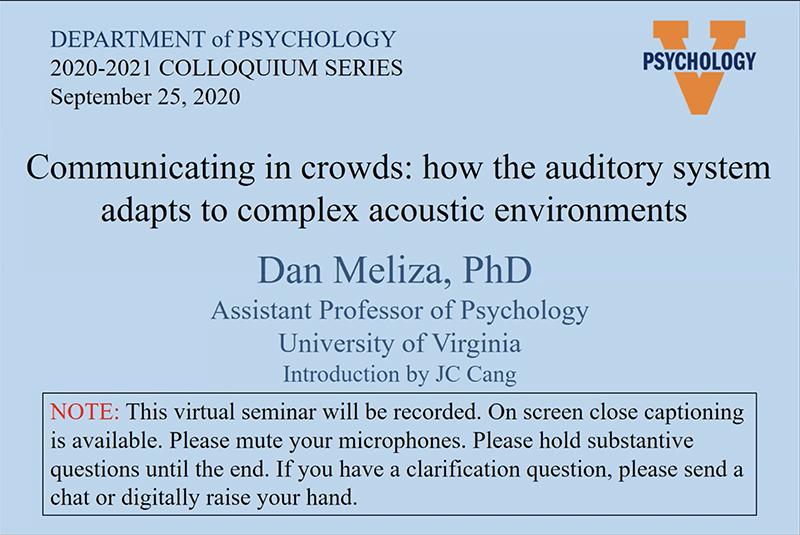
How Culture Influences Our Emotions (and Why It Matters) | Jeanne L. Tsai, PhD
SEPTEMBER 18, 2020
